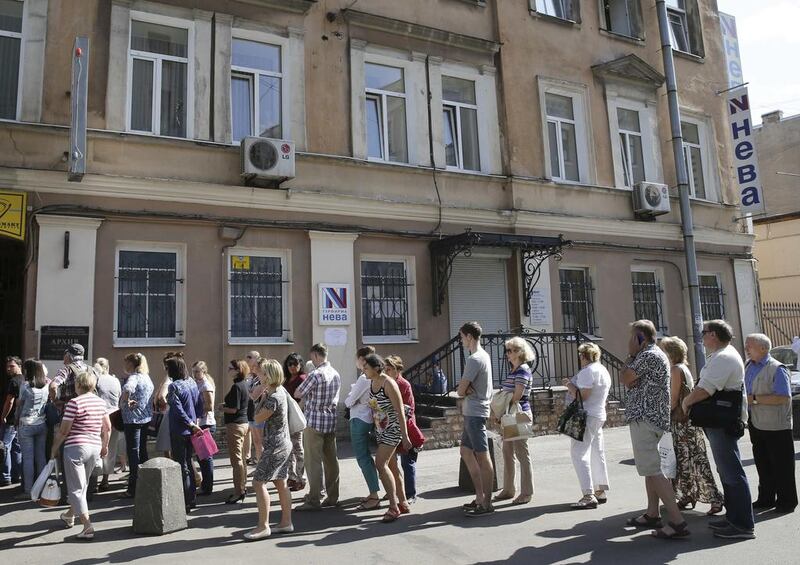Tour operators in the Emirates handling the large inbound Russian and Ukranian travel market expect to diversify to other Central Asian markets to recover from a loss of business caused by political and military conflict.
Five Russian travel agencies have closed operations in the last two months with the latest, IntAer, shutting down on Tuesday due to declining demand on the back of the weakening Russian rouble and the crisis in Ukraine.
Yesterday, the rouble slid to a four-month low on concern that the Russian president Vladimir Putin may be preparing to send troops into eastern Ukraine.
The rouble has fallen 4.9 per cent against the US dollar in the past month as the United States and the European Union announced tougher sanctions on some Russian companies and industries.
Russia was Dubai’s fifth largest source market last year, when 403,990 guests from that country checked into the emirate’s hotels. The number was a 2.9 per cent rise over the previous year.
Of the Russian tour operators that have closed operations, IntAer, Labirint and Neva had the greatest number of tie-ups with agencies abroad, including in the UAE.
“We are seeing a decline in the business from Russia due to the current crisis where the [uncertainty in Ukraine] is creating a certain tension for any movement within the region, concerns about getting stuck while travelling [abroad] and the uncertainty created by the [Malaysia Airlines] MH[17] crash,” said Ajay Nair, the head of corporate travel and sales for the UAE at the Dubai-based anta. Globalstar.
“Currency fluctuation, political uncertainty and also the isolation by a lot of countries, including global restrictions put on the Russian government”, were taking a toll, he said.
In the first half of this year, the company handled 325 people, down from 450 in the same period last year. While luxury travellers prefer to stick to Dubai, budget travellers choose Sharjah, Ajman, Ras Al Khaimah and Fujairah’s beach properties, Mr Nair said.
His company managed to cushion the effect by looking to other Central Asian markets, such as Kazakhstan and Uzbekistan. One of its global partners in Russia is also helping it bring family, independent and corporate travellers.
The closure of four Ukrainian tour operators has also hit the sector in the UAE.
“The payment cycle was slow for the past six months, but we didn’t know these would go bankrupt,” said Kulwant Singh, Lama Tours’s managing director. “We are going the legal route, trying to recover our money, but there’s nothing much we can do.” The company handles 5,000 Ukrainian tourists a year.
Lama Tours, which handles 11,000 Russian tourists a year, did not have ties with the shuttered Russian tour operators, but Mr Singh said the “situation is quite alarming”.
The closure of the Moscow-based IntAer came three days after Labirint, also based in the city, suspended operations, stranding as many as 27,000 Russian tourists abroad.
A “sharp drop in demand and purchasing power due to the sharp rise in the exchange rate and negative political situation” forced the closure, according to a statement on IntAer’s website.
Businesses were hit in April when government employees and military personnel were asked to avoid travelling abroad.
In July, one of the oldest tour agencies, Neva, said it could not continue operations, cancelling 6,000 tours abroad, according to the Moscow Times. Two smaller companies, Expo-Tour and Roza Vetrov Mir, also went the same way last month.
Most were unable to sell on the large number of airline tickets they had purchased at the beginning of the travel season, said Ksenia Buzlaeva, the commercial director for the Moscow-based Premium Club Travel. It partners with Emirates Airline and Etihad Airways to bring tourists to the UAE.
The Russian travel season lasts between September and June. Last season Ms Buzlaeva’s agency helped bring 6,000 tourists to the UAE, up by 10 per cent over 2012.
“The UAE is our largest market and we were not affected, and we expect more people in the next season,” Ms Buzlaeva said. “We are thinking that more people will be interested in the UAE than other countries.”
ssahoo@thenational.ae
Follow The National's Business section on Twitter






